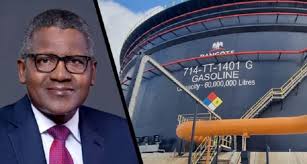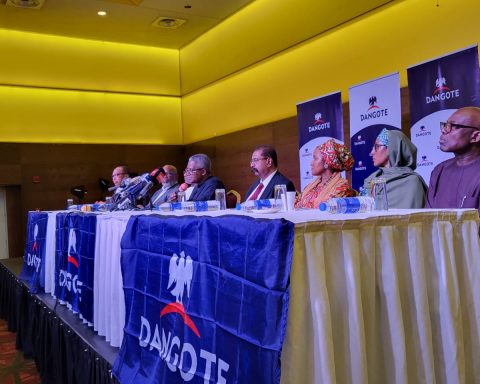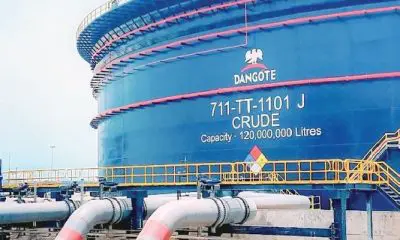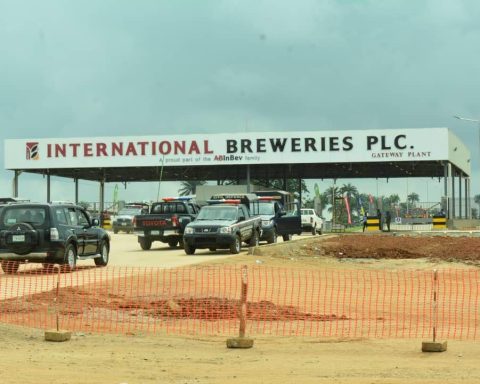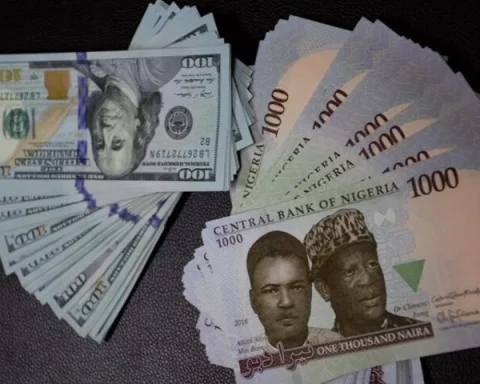The Dangote Refinery is set to transform Nigeria’s fuel supply chain with its Premium Motor Spirit (PMS) and diesel distribution plan nationwide.
In a statement released on Sunday, the Africa’s largest petroleum refinery said it will, effective from 15th of August 2025, begin distribution of PMS and diesel to marketers, petrol dealers, manufacturers, and telecoms firms, among other large users across the 36 states and the Federal Capital Territory.
Join our WhatsApp ChannelThe company promised to offer free logistics to marketers as part of measures to boost the fuel distribution network.
The company emphasised that the distribution plan would reduce the cost of fuel and consequently lower the cost of production, reduce inflation, and foster economic growth.
The initiative will benefit key sectors such as manufacturing, telecommunications, and agriculture, among others.
The Dangote Refinery revealed that it has invested in the procurement of 4,000 brand-new Compressed Natural Gas (CNG)-powered tankers and will also set up CNG stations, “commonly referred to as daughter booster stations, supported by a fleet of over 100 CNG tankers across the country to ensure seamless product distribution.”
“This strategic programme is part of our broader commitment to eliminating logistics costs, enhancing energy efficiency, promoting sustainability and supporting Nigeria’s economic development. It affirms our dedication to improving the availability and affordability of fuel, in support of broader efforts to strengthen the economy and improve the well-being of all Nigerians,” the company stated.
READ ALSO: Dangote Refinery A Model For Africa’s Industrialisation – ECOWAS
Benefits of the Dangote Refinery Fuel Distribution
Free Delivery to Marketers
The 650,000 barrels per day refinery declared that it would offer free delivery of PMS and diesel to marketers to boost distribution across the country. This will remove logistics and transportation costs for marketers.
Credit Facility for bulk buyers
The refinery also announced that it would offer a credit facility to bulk buyers supported by a bank guarantee. This credit facility, it clarified, is offered to those purchasing a minimum of 500,000 litres, “allowing them to obtain an additional 500,000 litres on credit for two weeks, under bank guarantee.”
Lower fuel prices at the point of sale
Local refining eliminates high shipping and import costs, which could lead to cheaper petrol and diesel prices in the long run. Reduced logistics expenses (no need for international freight) consequently translate to lower pump prices for consumers.
The Dangote Refinery said the effort is part of its vision to revolutionise Nigeria’s energy sector. “Our goal is to provide equitable access to affordable fuel for all Nigerians, regardless of location, making energy more accessible and sustainable for everyone, company.”
Steady Supply and Reduced Scarcity
Nigeria has in the past, faced persistent fuel scarcity due to reliance on imports and inefficiencies in distribution.
The Dangote Refinery’s 650,000 barrels per day capacity has reaffirmed its commitment to ensuring stable domestic supply, reducing shortages and queues at filling stations.
The new distribution plan, it said, will improve fuel accessibility for both urban and rural communities.
Job Creation and Economic Growth
The company stressed that the new distribution plan is expected to revive inactive petrol stations, thereby driving job creation, stimulating small and medium-sized enterprises (SMEs), increasing government revenue, improving fuel access in rural and underserved communities, and strengthening investor confidence in Nigeria’s downstream petroleum sector.
Environmental sustainability
The Dangote Refinery’s delivery system of deploying thousands of CNG trucks offers an opportunity to promote environmental sustainability by using gas, which is a cleaner form of energy.
The company also assured that it is producing high-quality Euro V and VI standards and urged Nigerians to buy high-quality vehicles and equipment.
Experts have averred that the Dangote Refinery’s PMS and diesel distribution plan is a game-changer for Nigeria’s downstream petroleum sector and the economy generally. Aside from promising cheaper fuel, stable supply, and job creation, it the scheme would also lead to forex savings, and boost industrial growth, while reducing the country’s reliance on imports. If managed effectively, they remarked, it could mark the beginning of a new era in Nigeria’s energy sector.
Development Economist and Policy Expert Prof. Ken Ife, said the initiative will make PMS more available nationwide, removing cases of hoarding.
While noting that it implies price equalisation, Prof. Ife estimated that it will cost Dangote Refinery nothing less than N200 billion, invariably transferring a subsidy from the public sector to the private sector.
Fear of Monopoly
Petroleum marketers have expressed apprehension about the monopoly of the market by Dangote refinery.
Petroleum Products Retail Outlets Owners Association of Nigeria (PETROAN) said the Dangote refinery’s distribution plan could lead to a monopoly in disguise.
“The Petroleum Products Retail Outlets Owners Association of Nigeria (PETROAN) has raised concerns about Dangote Refinery’s forward integration adoption, warning that it could lead to a monopoly in disguise and pose a significant job loss threat to Nigeria,” PETROAN said in a statement signed by its national public relations officer, Joseph Obele, on Monday.
Prof. Ife, however, countered the argument that the initiative would create unemployment. “I have listened to the arguments of those who said it will lead to unemployment. I don’t think that is true,” Prof. Ife said when he appeared on Arise News.
“Lower cost will be the underlying impact of this initiative,” he added.
READ ALSO: Naira-for-crude Made Petrol Cheaper, Available In Nigeria – Dangote
On his part, CEO of the Centre for the Promotion of Private Enterprise (CPPE), Dr Muda Yusuf, said Dangote Refinery’s distribution plan would help customers outside Lagos who are paying a premium for the additional cost of transportation.
While inviting marketers, petrol dealers, manufacturers, telecom companies, and all key stakeholders to embrace this landmark initiative, the company clarified that the registration process, including Know Your Customer (KYC) verification, will take place from 16 June to 15 August, spanning a total of 60 days.
Nigerians await the outcome of this initiative.
Victor Ezeja is a passionate journalist with seven years of experience writing on economy, politics and energy. He holds a Master's degree in Mass Communication.



